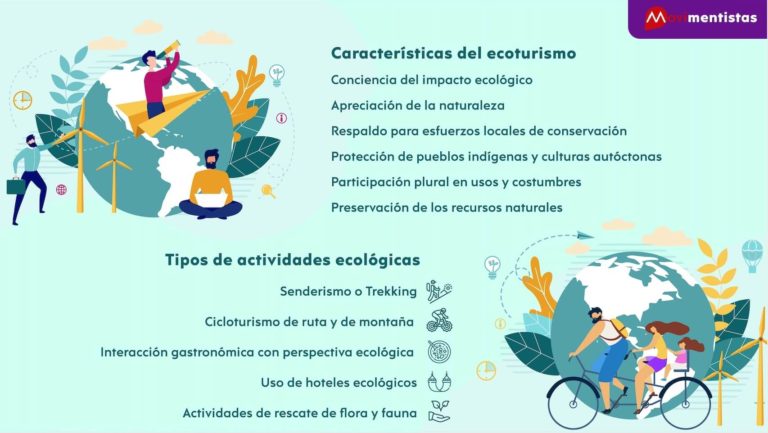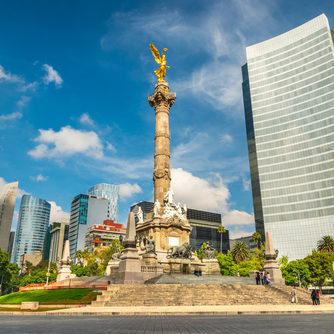Ecotourism: What Does Ecological Tourism Mean?
Ecotourism, or ecological tourism, consists of practicing tourism that preserves the environmental and social balance of natural areas and biosphere reserves, where inhabitants promote a culture of respect for the flora, fauna, and habitat where these organisms reproduce their life cycle.
While conventional tourism or mass tourism often leads to the destruction of ecosystems, ecotourism as a form of sustainable tourism involves learning to preserve natural resources and promoting fair economic activity for communities that live, socialize, and work in direct contact with nature.
It is a type of tourism that is conscious of the fact that preserving resources for future generations means respecting the right to well-being for present generations of cultures and peoples whose communities exist in forests, jungles, beaches, and mangroves. Therefore, ecotourism or ecological tourism has an integral and multidimensional nature.
What are the characteristics of ecotourism?
- Awareness of the ecological and socioeconomic impact on the community.
- Appreciation of nature as universal heritage.
- Support for local conservation efforts.
- Sustainable benefits for indigenous peoples, native cultures, and rural areas.
- Determined through participatory methods, such as local customs and traditions.
- Education and training for visitors and residents on the preservation of natural resources.
The characteristics of ecotourism distinguish it from conventional tourism, the latter being an industry that consumes water, electricity, land, and air that can no longer be sustained. In contrast, sustainable tourism is essentially a recreational, economic, and educational activity consciously designed to preserve the environment.
Conscious tourism or ecological tourism, using academic terms, is an affirmative action because it aims to remedy the damage caused by indiscriminate exploitation of nature.
Why is ecotourism important and what are its benefits?
The benefits of ecotourism derive from promoting a new model for the tourism industry that creates opportunities for those living in rural communities to not have to leave due to economic reasons:
- Creates jobs for humble farmers and small farm owners.
- Transfers knowledge of environmental preservation.
- Promotes native cultures and ethnolinguistic heritage.
- Boosts social well-being for marginalized groups.
- Respects cultural diversity and helps combat racism.
- Raises awareness about the interactions between flora and fauna in the cycle of life.
- Prioritizes physical activities that do not depend on motorized vehicles.
- Deepens the habit of sustainable travel.
- Revives the consumption of fruits and vegetables native to these regions as the basis of a healthy diet.
Sustainable tourism is important as it integrates ecological, social, and economic goals within an educational project that prioritizes the universal right to nature.
In the past, the importance of ecotourism was defined in a unidimensional way: ecotourism meant traveling without polluting or contaminating. However, now this importance is defined in a multidimensional way, encompassing communities as part of ecosystems: ecotourism is a conscious form of tourism that considers both the biological factors of the life cycle reproduction and the need for fair economic development for residents, respecting their culture.
Infographic with the characteristics and types of ecotourism activities.
Let’s see some examples of activities adapted to ecotourism:

What kind of activities represent the practice of ecotourism?
Let’s look at some examples of activities adapted to ecological tourism:
- Hiking or Trekking
Group of hikers practicing ecotourism and walking through the mountains in Langtang, Nepal. Long walks through the forest, crossing streams and hills in the midst of the harmony of nature, should be guided by leaders trained in ecotourism and the preservation of resources.
- Road and Mountain Cycling
Two people practicing cycling in the mountains in Bolivia. Cycling is one of the representative activities of ecotourism and has specific guidelines based on the needs of cyclists, route infrastructure and accommodation, mobility services to cycling routes, and journeys to identify animal and plant species.
- Gastronomic Interaction with an Ecological Perspective Street food buffet in Luang Prabang, Laos.
Another conscious tourism activity that promotes ecological, economic, and social aspects are agricultural fairs and dynamics of organic product tasting. Fruits, vegetables, and other foods are directly supplied by the community.
- Ecological Hotels Ecological cabins for ecotourism in front of a lake in a forest.
Unlike resorts that consume large amounts of water, electricity, and land, ecological hotels take advantage of clean energy such as solar and wind power. They are also operated by community members trained in caring for their own community.
- Flora and Fauna Rescue Activities Red flowers at sunset.
Engaging in ecotourism means immersing oneself in information about the endemic species of the visited place. Service providers and small producers should also promote learning mechanisms for their visitors to understand the threats to wildlife and how to prevent them.
What are some countries where ecotourism is popular? View of waterfalls and a wooden kiosk in a park full of green nature in Laos, one of the countries for ecotourism.
Laos
Laos is a landlocked country in Southeast Asia, situated between Thailand and Vietnam, with China to the north and Cambodia to the south. Its lack of beaches is compensated by forest coverage that spans over half of its territory, of which more than 15% is protected natural areas. According to UNESCO, Laos is home to nearly 50 distinct ethnic groups.
This country has a long-standing ecotourism strategy that includes hiking in northern regions like the Vieng Phou Kha district to observe agile black-cheeked gibbons swinging through the trees and robust gaurs grazing in the plains of the tropical forest.
Sunset on Easter Island with the figures of Moai statues.
Easter Island, Chile On the other side of the world, in South America, lies the still relatively unexplored Los Lagos region in southern Chile. While the Andean country is more renowned for its natural beauties at the extremes of its territory, such as the Atacama Desert, Tierra del Fuego, and Easter Island (Rapa Nui), the Los Lagos region boasts beautiful national parks, quaint small towns, and a rich local culinary tradition.
Whether in the capital city of Puerto Montt, on the stunning Chiloé Island, or along the shores of Lake Llanquihue in towns like Puerto Varas and the folkloric Frutillar, water, land, and trees exist in perfect balance. Perhaps the best activity to explore Los Lagos is taking catamaran journeys from the Chilean Patagonia to the Argentine Patagonia, reaching San Carlos de Bariloche, where winter sports are practiced in the middle of the year.


